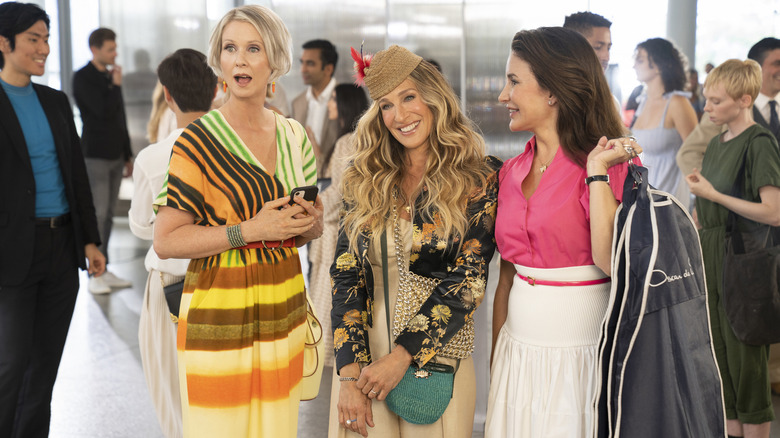
It's the season of nostalgic revivals, and "Sex and the City" has joined the ranks with "And Just Like That..." which sees the Manhattan ladies tackling life in their 50s. The news around it seemed mostly vague, except to say that it was clearly opting for a more socially conscious mentality than its predecessor. Gone are the days of not believing in bisexuality and here we are with "woke moment" buttons and soundbites. It's a brand new day for Mrs. Bradshaw and co.
The first two episodes of the revival dropped to very mixed reactions. I personally feel quite invested in this little experiment, as "SATC" was hugely formative for me in my late teens and early 20s when I thought I knew everything and actually knew f*** all. Hell, I'm 33 and I still don't really know much about life, I'm just more comfortable in the lack of certainty inherent with, you know, living.
The very notion that I'm in a position to review a "SATC" series is kind of surreal to me. But I am. And as a married woman with her fair share of relationship baggage in the rearview mirror, I was very excited and cautiously curious about what was coming. I had my hunches, of course. And now I feel as though my instincts were right. But I still wasn't fully prepared for what was coming.
I couldn't help but wonder, what would "Sex and the City" look like if it shed the superficiality of the second, ill-conceived movie in favor of the weight and nuance of the series in its heyday?
Hello It's Me
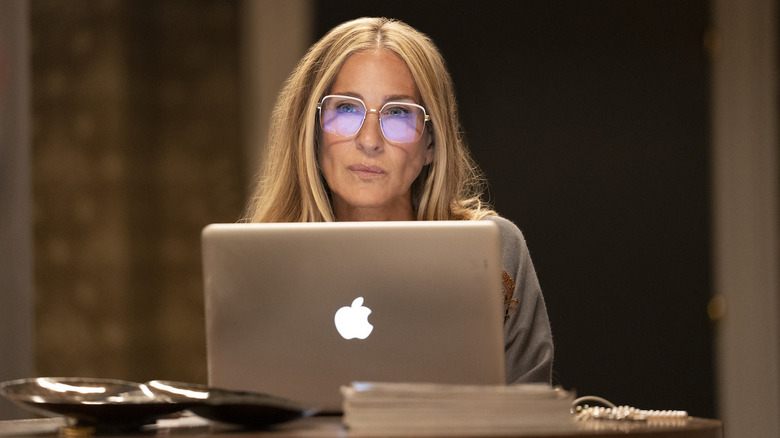
The first episode starts innocuously enough with brunch, but it's not the same type of gab and nosh they used to have. It's not the Manhattan of the late '90s or early '00s, and while the writers clearly didn't want to linger on Covid (they brush right past it like a footnote), something else feels ... off.
The banter sounds the same as it always has, only now, Carrie's (Sarah Jessica Parker) got a bit less patience than usual, and not in a cute, loving way. Miranda's (Cynthia Nixon) as Miranda as she's ever been, which is nice, and she and Carrie together feel familiar and comfortable. Charlotte (Kristin Davis), on the other hand...
At brunch, she nags Miranda about dying her hair, saying that her natural grey locks make her look old. She seems pious now, but maybe she always was? She used to be very particular (read: uptight), but I can't tell if this feels like amplified Charlotte or if her usual prissiness is just no longer charming. It honestly makes me question if it ever really was.
There are brief mentions of Samantha (Kim Cattrall) in shoehorned conversations with people they don't really like. A brutally awkward exchange with the perpetually baffling Bitsy Von Muffling (Julie Halston) has the ladies using deliberately obtuse language alluding to the notion that Sam Jones is dead.
She isn't. She's just in London. Evidently, Carrie let her go as her publicist, and the Samantha we all know and love couldn't handle the embarrassment of the perfectly rational decision and moved to London for work. Of all the possible ways to handle Cattrall not wanting to be a part of the series, this has to be the least Sam Jones of the lot.
Miranda's always been a little socially awkward, but this time around she's thrown into a whole new sphere of cringe. She's out of her depth, which is an unfamiliar place for her as she's usually incredibly confident and competent at her job. But going back to school to get her master's degree means pointing out all of the glaring ways she's thoroughly out of touch with the world and just how old she actually is. She proceeds to go on a profoundly uncomfortable rant shoving both feet and most of her legs up to the knee into her mouth.
Carrie gets derailed during a podcast recording session when charismatic host Che Diaz (Sara Ramirez) asks her a question about masturbation. Le gasp! Somehow, even Carrie is out of her depth, and sex has been her bread and butter for decades. Che tells her that she needs to dialogue with them more on the show and step her pussy up, and Carrie's reaction is to make excuses. She admits to giving Che her best stuff in her interview, inadvertently admitting at the same time to coasting now.
Charlotte, meanwhile, is insisting that her daughter, Rose (Alexa Swinton), wear a coordinating Oscar de la Renta dress to her sister, Lily's (Cathy Ang) piano recital. Rose clearly doesn't want to wear the damn thing, but it's what Charlotte wants, so it's what Charlotte gets. Not quite the way she wanted it, but she got her way regardless.
They're All Selfish
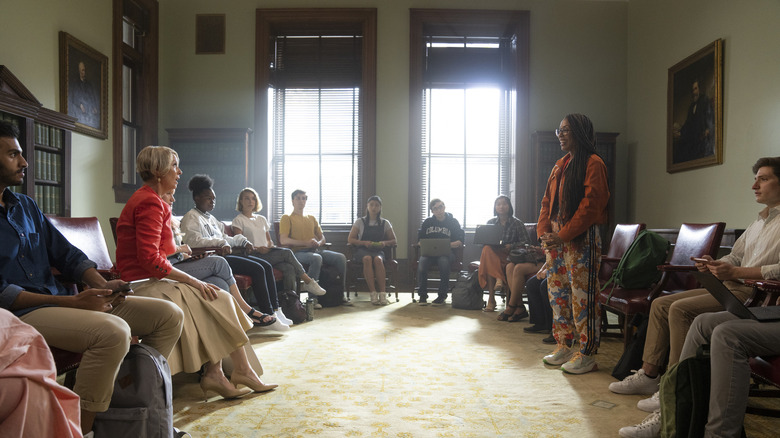
Ultimately, these women have always been selfish. Their lifestyles and their behavior — and I'm not talking about their sex lives — tend to veer towards the self-centered and hedonistic beyond sex. Miranda initially refused to move to Brooklyn because of vanity; Carrie couldn't afford a downpayment on her home because of the literal tens of thousands of dollars she'd spent on just shoes alone in a closet full of designer labels (on a weekly columnist's salary!!!); Charlotte tried to force the picture-perfect life with a man she barely knew because of how he looked, and when she found quite literally her perfect match, she blew it because she treated him like garbage.
Now, Miranda was so worried about saying the wrong thing in class that she just kept saying everything wrong, Charlotte is so obsessed with appearances that she's alienating her daughter with little regard for her comfort, and Carrie has spent so long resting on her laurels that she's become stuffy and shockingly uptight. As Che told her, she has to start giving them more or there's going to be a problem.
But at the end of the day, not everything is about her. Or Miranda, or Charlotte, for that matter. The series always positioned them at the center of the universe, and that was fine at the time, but it genuinely doesn't fly anymore. It seems like the writers are viscerally aware of this.
The Big Reveal
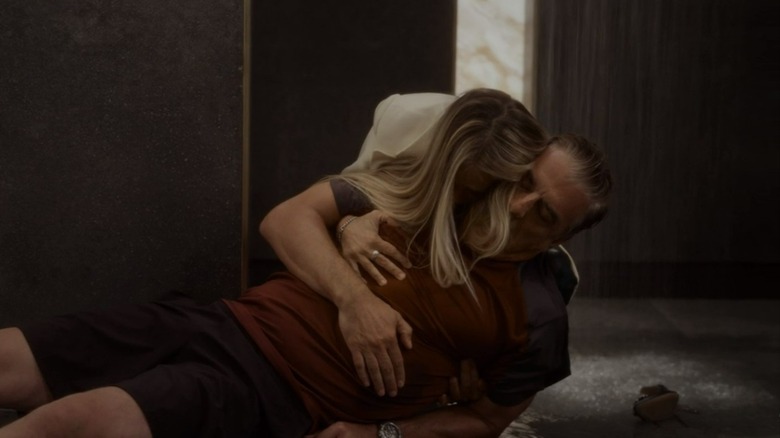
After decades of heartache and severely f***ed up issues that definitely require a therapist to unpack, Carrie and John James "Big" Preston are happily married. It almost feels like we could have gone straight from the first movie to this revival, quite frankly. And that's the way my brain is processing things, so that's how this is going to go. But it's nice to see them happy together. Really, genuinely happy. No games, no fear, just a real partnership. Finally. They cook together, reminisce, have nightly traditions (albeit in this case a relatively young one that started during the first lockdown). But there's love, comfort, and genuine joy.
And just like that, Big died.
Just as they got their happily ever after, he had a heart attack and died in her arms.
Yes, he had been exercising. No, that wasn't why he died, you dolt! The man had never taken proper care of himself, smoked cigars, ate terribly, drank like a fish, and didn't exercise regularly. He's now somewhere in his 60s after having had a previous heart attack and heart surgery. This was almost inevitable, and he was so close to death when she found him that calling an ambulance in Manhattan traffic wouldn't have saved him.
The point is, this set a new standard. Like killing Janet Leigh less than halfway into "Psycho" in 1960, it establishes that no one is safe, anything can happen, and to brace for impact.
Big changes are coming (pun intended), and I'm convinced they're going to be good.
Little Black Dress
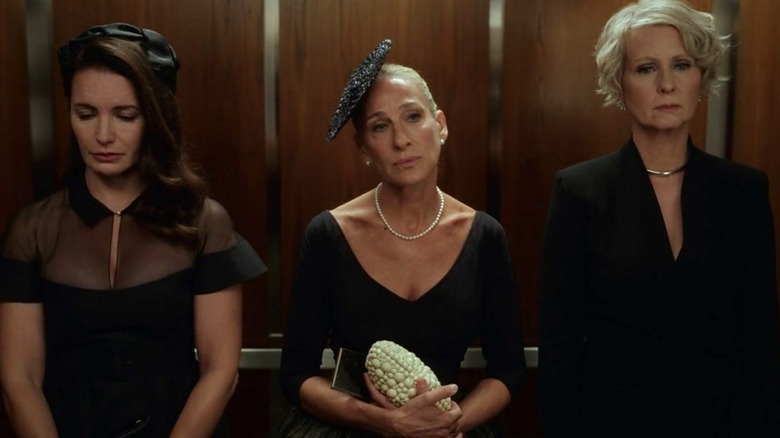
The second episode starts simply and mundanely as Carrie calls Miranda to tell her the news. Miranda comes over immediately, and Carrie's hair is still damp from holding Big in the shower. It's not the same kind of grief and pain that we saw in the first movie, because this is something none of them have ever experienced before — the death of a spouse.
This is the kind of loss that kicks your feet out from under you while you're expected to keep walking. The coroners are taking Big's body away out of focus in the background. Carrie asks "What do I do now?" to which Miranda starts to reply by breaking down details of the next steps and funeral planning. But that's not what Carrie means.
It was painful hearing Carrie call out John's name. It doesn't help that my husband's name is Jon, so of course, all I could think about throughout this entire episode was "what if I was planning his funeral? I may have to do that someday." Unfortunately, I have experienced the loss of a boyfriend before, and the pain is no less valid because I was a teenager when it happened. The idea of losing my person makes my heart drop and my soul hurt.
So what do you do then?
You plan. You go through paperwork, visit funeral homes, and make arrangements. And, hopefully, you get to do all of that while surrounded by a strong support network who can help you.
Enter Charlotte.
We Need To Talk About Charlotte
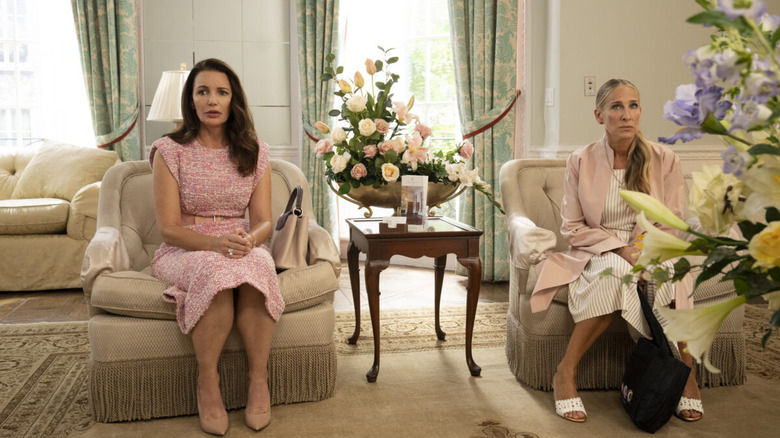
As in the previous episode, her behavior is reprehensible, second only to Stanford Blatch's (Willie Garson).
I'm still not sure if they've amplified the least likable traits of the characters for these first two episodes or if the behavior is just no longer so winsome, but it's making an impact. Steve (David Eigenberg), who once behaved like an overgrown child on a regular basis is now the oldest 55-year-old in history. Stanford, who, like everyone else on the show, always had a bit of a superficial flare now feels like an awful person in a Stanford Blatch chassis. Miranda, who used to act like she knew everything (she usually did, but she was a bit of an ass about it), now moves through complex situations with all the subtlety of a demolition derby. Carrie, ever the neurotic, doesn't seem to have learned that compassion and open communication are the best ways to solve problems.
Anthony (Mario Cantone) is still pretty much the same, though, and Harry (Evan Handler) is still an absolute mensch.
Then there's Charlotte. I do not remember her being quite this self-centered, but maybe it's for emphasis. She spends the duration of the episode openly (and loudly) blaming herself for Big's death, sobbing while accompanying Carrie to look at funeral homes, and quite literally centering herself in Carrie's loss.
It isn't until the end of the episode after Big's ashes arrive and Carrie calls Miranda and Stanford but not Charlotte, that there's any real consequence for her behavior. Thankfully, Carrie is very blunt with Charlotte, flat out telling her that she's centering herself in everything while it's her husband who died. It's the wake-up call Charlotte needed, and it won't be the last.
The Funeral
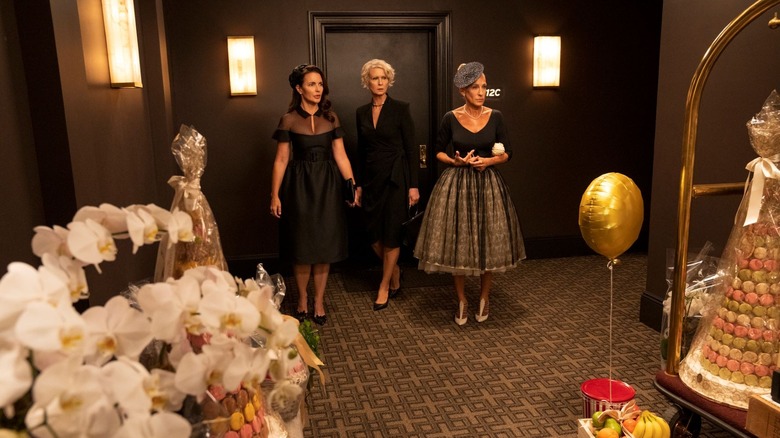
It's beautiful. It's tasteful. It's also unfortunately awkward.
Like having seen Bitsy at brunch, the Bits is back and she comes bearing "wisdom" that no one asked for. "They don't know, but I know." Bitsy's a widow, now, too. In her mind, this gives her carte blanche to tell Carrie no one will understand but her. The inimitable Susan Sharon (Molly Price) makes a deeply unpleasant appearance to remind us that she's still deeply unpleasant while holding a grudge and behaving badly. And Big's secretary (that's what she prefers to be called), Gloria (Brenda Vaccaro), has an uncomfortably strange reaction during a memorial video.
There is one exceptional encounter, however, that will undoubtedly influence the rest of the season — Che gets Brady (Niall Cunningham) high.
Catching him smoking, Miranda promptly explodes on Che, not knowing who they are. Shortly after making Brady fear for his very existence, Miranda is formally introduced to Che by Carrie, who remains oblivious to the situation. The result is a shockingly endearing conversation between the two followed by Che nicknaming Miranda Rambo. I'll say this — BJ Colangelo was right.
When In Rome
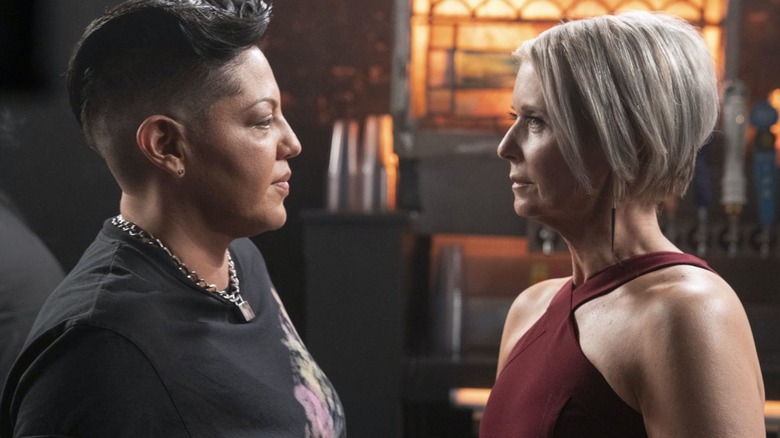
In the third episode, the drama is back, which threatens to lean the show into juvenile territory. These women are in their 50s, and while they were never the best at communication (with anyone but each other, and sometimes not even then), the hope is still that, by this age, they've learned a thing or two.
Carrie's issues with Natasha "The Idiot Stick Figure With No Soul" Naginsky (Bridget Moynahan) rear their ugly head again during the reading of Big's will. It seems he's leaving her the grand sum of $1 million, and no one has any idea why. Naturally, this sends Carrie reeling, flinging her back into old habits of chronic fear, a sense of rejection, inadequacy, and jealousy.
Honestly, I don't blame her. Not entirely, anyway. She's going through it right now, and as Susan Sharon aptly but inappropriately pointed out during Big's funeral, he was a real prick to her for a long time. The man left her at the altar on their first pass at their wedding day, on top of everything else.
Suffice to say, there's baggage.
In an attempt to find answers, Carrie tries contacting Natasha, only to be brutally rebuffed at every turn. At one point, while Carrie is in her office lobby after having watched her walk into the building, Natasha's assistant comes out to say she's currently in Rome.
Eventually, through random chance, Carrie actually gets her conversation with Natasha ... after accidentally walking in on her peeing in a coffee shop bathroom. It's not ideal, but it got the job done! After all the drama, doubt, jealousy, and anger, it turned out that Natasha had no clue why he left her the money, either. They hadn't spoken since the divorce. Natasha even wondered out loud why he ever married her "when he was always in love with you."
The Heart Of The Matter
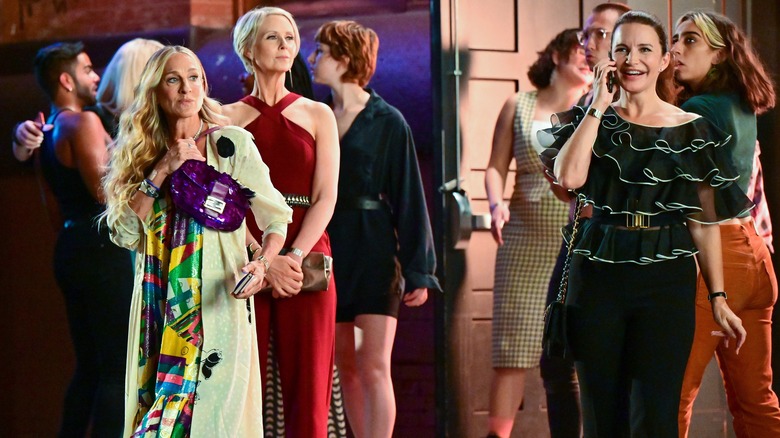
Everyone's forced to deal with their s*** this week. Carrie has to confront her clearly unaddressed trust issues with Big and her insecurity, Charlotte is forced to grapple with the reality of life's unpredictability instead of trying to control everything, and Miranda unwittingly confronts her what undoubtedly amounts to her queerness.
Again, BJ Colangelo was right. To quote her directly when I texted to tell her as much, "I KNOW MY GAY S***!"
Reader, she certainly does.
The trio goes to the taping of Che's Netflix special, which winds up being a revelatory experience. Miranda has an "ah-hah!" moment that verges on "oh, f***" when it clicks that she's not living very honestly. As Che cheers, "If you're sad, change things," Miranda looks simultaneously terrified and inspired. Che later shotguns a joint into Miranda's mouth at their afterparty, and that look is anything but platonic.
Meanwhile, Charlotte has her own very important revelation. Earlier in the episode, Rose tells her that they no longer want to be referred to as a girl because they don't feel like one. Charlotte, of course, panics. She has no clue how to properly navigate the situation. Thankfully, at Che's show, they spoke very candidly about their family's unwavering support. Coupled with their thorough confusion, mind you, but still endlessly loving and supportive despite that. While Charlotte still likely doesn't have the first idea of how to approach this situation, she does know that as long as Rose knows that they are loved and supported, everything else will be fine.
I've always been a glass-half-full kind of person. I try to be, anyways. And when it comes to how I engage with media, I've always opted more for the feeling of something rather than its arguably objective qualities.
"Sex and the City" was always about serious self-reflection. Navel-gazing, if you will. I found it therapeutic to watch other people deal with things that scared me so I could potentially feel more comfortable navigating comparable situations myself. Rejection, heartbreak, sexual exploration, you name it. In my mind, that was the show's biggest strength — its humanity.
Don't get me wrong, it exists on a different plane of existence, in an alternate realm of privilege altogether. But its heart has always been genuine, and that's what I love about it.
This week's episode really solidified that for me. The revival isn't perfect, not by a long shot. It's very Pick Me with its energy, desperately trying to be more current, staving off some kind of terrifying yet inevitable obsolescence. But despite its shortcomings, its heart is intact and genuine.
Ultimately, the show needs to change and the writers clearly want to nurture that. To comment on issues pertaining to race, gender, sexuality, and grief in the same way the show initially commented on gender equality, sexual liberation, and independence is vital. Whether it's for a bottom line or stems from a desire to do good becomes irrelevant when the end result is normalizing conversations that most of the country and much of the world are averse to having in the first place.
There is immense value to be found in seemingly frivolous mainstream discussions of complex issues. They open a door into a seemingly frightening world and shine a light. For many, that kind of mainstream representation is invaluable.
We'd be wrong to look down our nose at it.
Read this next: 14 Greatest Romance Films Of All Time
The post And Just Like That, It Was Time For A Big Change appeared first on /Film.
from /Film https://ift.tt/3Jc8NKa
